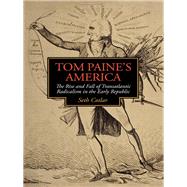Tom Paine's America
, by Cotlar, Seth- ISBN: 9780813931005 | 0813931002
- Cover: Hardcover
- Copyright: 3/31/2011
Tom Paine's America explores the vibrant, transatlantic traffic in people, ideas, and texts that profoundly shaped American political debate in the 1790s. In 1789, when the Federal Constitution was ratified, "democracy" was a controversial term that very few Americans used to describe their new political system. That changed when the French Revolution -- and the wave of democratic radicalism that it touched off around the Atlantic World -- inspired a growing number of Americans to imagine and advocate for a wide range of political and social reforms that they proudly called "democratic." One of the figureheads of this new international movement was Tom Paine, the author of Common Sense. Although Paine spent the 1790s in Europe, his increasingly radical political writings from that decade were wildly popular in America. A cohort of democratic printers, newspaper editors, and booksellers stoked the fires of American politics by importing a flood of information and ideas from revolutionary Europe. Inspired by what they were learning from their contemporaries around the world, the evolving democratic opposition in America pushed their fellow citizens to consider a wide range of radical ideas regarding racial equality, economic justice, cosmopolitan conceptions of citizenship, and the construction of more literally democratic polities. In Europe such ideas quickly fell victim to a counter-Revolutionary backlash that defined Painite democracy as dangerous Jacobinism, and the story was much the same in America's late 1790s. The Democratic Party that won the national election of 1800 was, ironically, the beneficiary of this backlash; for they were able to position themselves as the advocates of a more moderate, safe vision of democracy that differentiated itself from the supposedly aristocratic Federalists to their right and the dangerously democratic Painite Jacobins to their left.






